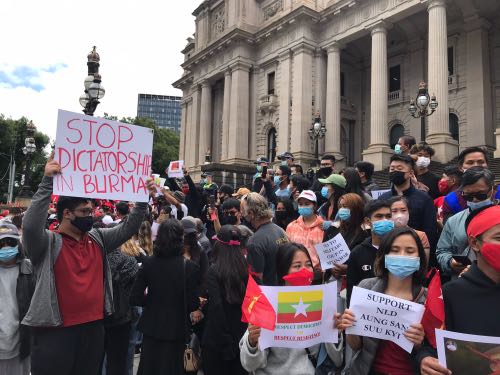A civil war is the worst fear gripping the people of Myanmar after a powerful army overthrows a popular government in the country. After all, it has a long history of civil wars since gaining independence from British rule in 1948. When ethnic hostilities deepened during Myanmar’s 14-year brush with democracy and the army ruling after the 1962 coup. Almost 59 years later – on 1 February 2021 – another coup d’état orchestrated by Military chief Min Aung Hlaing broke its second spell with democracy and heightened socio-political instability in a deeply divided country.
It’s Father vs Mother in Myanmar
Though before examining the eternal internal conflict, one needs to appraise the current political situation in Myanmar. And as things stand, the army has imposed a one-year emergency in the country. The operation was carried out hours before the first session of parliament was set to begin. Following this, in a series of raids, Myanmar leader Aung San Suu Kyi with President Win Myint and other political leaders of the National League for Democracy (NLD) were arrested.
The scenario is a result of a power tussle between the mother and father of the nation. The mother (as she is referred to by the people), is pro-democracy leader Aung San Suu Kyi, and the father is what Tatmadaw (the official name of the armed forces of Myanmar) considers itself. The balance of power between the two was disturbed after the general elections in November 2020. The mother emerged victorious winning over 80% of the vote and was bound to head the country.
The results didn’t go down well with the father, who expected a rerun of 2010 general elections with the Union Solidarity and Development Party (USDP) making a comeback. The military-backed party made some uneasy noise after the rout levelling the accusation of election fraud. An upset army made the allegation a ground for deposing a government elected by the people.
Constitution to blame for the coup in Myanmar?
Before the return of democracy in Myanmar, the military junta in 2008 drafted a lopsided constitution to hold sway over the nation. It guaranteed the army a quarter of parliamentary seats and control of three crucial ministries: home affairs, defence and border affairs.
Interestingly an amendment to the constitution demands the backing of three-fourths of parliament and the remaining one-fourth is mandatorily acquired by the army. It’s plain to see that the rules ensured the military supremacy in Myanmar and Aung San Suu Kyi’s NLD was not a threat to its dominance despite garnering 80 per cent votes in the elections. The real challenge to the army required 100 per cent votes instead.
The experts remain clueless about the move to impose an emergency in the country. Though many believe after decades of direct rule in Myanmar (and a five-year military-backed USDP governance under democracy), the army was desperate to regain full control and the NLD’s second term would have kept it out of absolute power for ten years.
Does Pariah state status loom on Myanmar?
After the takeover, the army cut off the state media TV and radios, snapped phone lines and internet across the country, soldiers blocked roads in the capital Nay Pyi Taw and city Yangon, banks, stock market and airport were closed.
Emergency rule has escalated the risk of Myanmar turning ‘a pariah state’ again with the United States categorically warning of new sanctions and several other countries, including the United Kindom, condemning the coup. The United Nations Secretary-General Antonio Guterres called it a blow to democratic reforms.
China’s response raises eyebrows
Did China have a role in the army coup in Myanmar? The question arose after China’s cautious response to the regime change. While the Chinese government urged all sides in Myanmar to resolve their differences, the Chinese media downplayed the turn of events dubbing it as ‘a major cabinet reshuffle’.
It is important to note that China calls itself a friendly neighbour of Myanmar, which is crucial for its access to the Indian Ocean. And to achieve this target, 29 out of 38 projects have been cleared under the China Myanmar Economic Corridor (CMEC).
Apart from this, China has made massive investments in Myanmar’s power, oil, gas and mining sectors, and a multi-thousand crores Chinese megacity project is underway in the country. The context is evident in the background of the Tatmadaw cosying up to China.
One should not lose sight of the inherent Chinese interest in Myanmar as it shares its border with four Indian states. China allegedly has been assisting the northeast militants hiding in Myanmar with arms and ammunition.
Protests in Myanmar and fear of civil war
Day after the coup with restrictions lifted partially, hundreds of people reportedly held protests in Myanmar’s Yangon. Releasing a statement, Aung San Suu Kyi’s party urged the army to respect the election results and release all leaders. The party appealed to the people to resort to civil disobedience against the coup d’état.
On the other hand, hundreds of army supporters, including nationalist Buddhist monks, celebrated Army Chief Min Aung Hlaing seizing power. Incidents like this have raised the fear of people vs people clashes.
Historian and author Thant Mynt-U reminded us with his tweets that Myanmar is a country with deep divisions across ethnic and religious lines.

Also Read: Protesters want Putin to go. Why is Russia on the boil?
The Myanmar army is engaged in a long-time civil war with four militias led by the Kachin Independence Army. In addition to that, the fight between the Shan, Lahu and Karen minority groups and the security forces continues, and the armed struggle between the Rohingya Muslims and the government refuses to abate in Rakhine state.











Middle East on Edge: Why the US Bombed Iran’s Nuclear Sites
Can Donald Trump’s ‘Golden Dome’ ever take flight without Canada cooperation?
How ‘Golden Dome Project’ could be a gamechanger?